

Serge Latouche. Jeremy Rifkin. Jeremy Rifkin (born January 26, 1945) is an economic and social theorist, writer, public speaker, political advisor and activist.
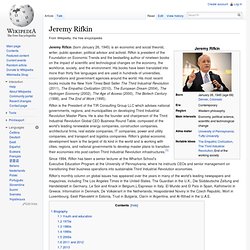
Rifkin is president of the Foundation on Economic Trends and the bestselling author of nineteen books on the impact of scientific and technological changes on the economy, the workforce, society, and the environment. His books have been translated into more than thirty five languages and are used in hundreds of universities, corporations and government agencies around the world. His most recent books include the New York Times Best Seller The Third Industrial Revolution (2011), The Empathic Civilization (2010), The European Dream (2004), The Hydrogen Economy (2002), The Age of Access (2000), The Biotech Century (1998), and The End of Work (1995). John Maynard Keynes. John Maynard Keynes, 1st Baron Keynes,[1] CB, FBA (/ˈkeɪnz/ KAYNZ; 5 June 1883 – 21 April 1946) was a British economist whose ideas have fundamentally affected the theory and practice of modern macroeconomics, and informed the economic policies of governments.
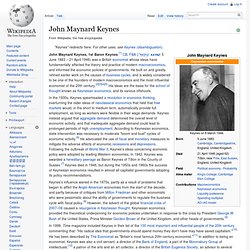
He built on and greatly refined earlier work on the causes of business cycles, and is widely considered to be one of the founders of modern macroeconomics and the most influential economist of the 20th century.[2][3][4][5] His ideas are the basis for the school of thought known as Keynesian economics, and its various offshoots. In 1999, Time magazine included Keynes in their list of the 100 most important and influential people of the 20th century, commenting that: "His radical idea that governments should spend money they don't have may have saved capitalism.
"[10] He has been described by The Economist as "Britain's most famous 20th-century economist. Karl Marx. Karl Marx[note 1] (/mɑrks/;[4] German pronunciation: [ˈkaɐ̯l ˈmaɐ̯ks]; 5 May 1818 – 14 March 1883) was a German philosopher, economist, sociologist, journalist, and revolutionary socialist.
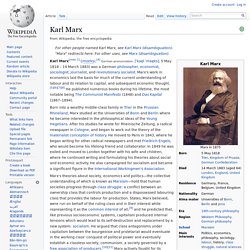
Marx's work in economics laid the basis for much of the current understanding of labour and its relation to capital, and subsequent economic thought.[5][6][7][8] He published numerous books during his lifetime, the most notable being The Communist Manifesto (1848) and Das Kapital (1867–1894). Born into a wealthy middle-class family in Trier in the Prussian Rhineland, Marx studied at the Universities of Bonn and Berlin where he became interested in the philosophical ideas of the Young Hegelians. Karl Marx : Le Capital. Paul Jorion. Paul Jorion (born July 22, 1946[1] in Brussels) is by training an anthropologist, sociologist with a special interest in the cognitive sciences.
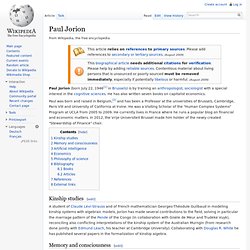
He has also written seven books on capitalist economics. Paul was born and raised in Belgium,[2] and has been a Professor at the universities of Brussels, Cambridge, Paris VIII and University of California at Irvine. He was a Visiting Scholar of the "Human Complex Systems" Program at UCLA from 2005 to 2009. He currently lives in France where he runs a popular blog on financial and economic matters. In 2012, the Vrije Universiteit Brussel made him holder of the newly created "Stewardship of Finance" chair. Kinship studies[edit] Antony C. Sutton. Antony Cyril Sutton (February 14, 1925 – June 17, 2002) was a British and American economist, historian, and writer.
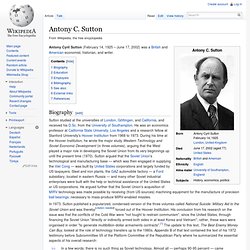
Biography[edit] Sutton studied at the universities of London, Göttingen, and California, and received his D.Sc. from the University of Southampton. He was an economics professor at California State University, Los Angeles and a research fellow at Stanford University's Hoover Institution from 1968 to 1973. During his time at the Hoover Institution, he wrote the major study Western Technology and Soviet Economic Development (in three volumes), arguing that the West played a major role in developing the Soviet Union from its very beginnings up until the present time (1970). Sutton argued that the Soviet Union's technological and manufacturing base — which was then engaged in supplying the Viet Cong — was built by United States corporations and largely funded by US taxpayers.
CHANGEMENT DE PARADIGME : CHANGEMENT DE VÉRITÉ, par El JEm. Billet invité.
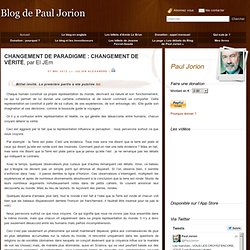
La première partie a été publiée ici. Chaque humain construit sa propre représentation du monde, décrivant sa nature et son fonctionnement, ce qui lui permet de lui donner une certaine cohérence et de savoir comment se comporter. Cette représentation se construit à partir de sa culture, de ses expériences, de son entourage, etc. Elle guide son imagination et ses décisions, comme la boussole guide le voyageur. Or il y a confusion entre représentation et réalité, ce qui génère des désaccords entre humains, chacun croyant détenir la vérité. Ceci est aggravé par le fait que la représentation influence la perception : nous percevons surtout ce que nous croyons. Par exemple : la Terre est plate. Avec le temps, quelques observateurs plus curieux que d’autres remarquent ces détails.
Nous percevons surtout ce que nous croyons. CHANGEMENT DE PARADIGME : NOUS SOMMES TOUS DES LEONARDO DI CAPRIO, par El JEm. Billet invité.
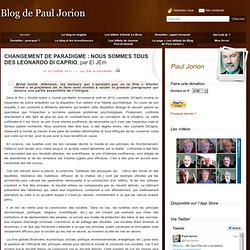
Attention, les lecteurs qui n’auraient pas vu le film « Shutter island » et projettent de le faire sont invités à sauter le premier paragraphe qui dévoile une partie essentielle de l’intrigue. Dans le film « Shutter island », tourné par Martin Scorsese et sorti en 2010, Leonardo DiCaprio incarne un inspecteur de police enquêtant sur la disparition d’un patient d’un hôpital psychiatrique. Au cours de son enquête, il est confronté à différents éléments qui rendent cette disparition étrange et laissent penser au spectateur que l’inspecteur a lui-même quelques problèmes psychologiques.